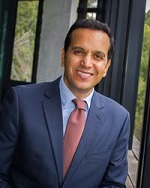ADI Director's new UNESCO leadership role to build cultural rapprochement
Media releaseThe New Year has brought a new challenge for Alfred Deakin Institute Director, Professor Fethi Mansouri, recently appointed to lead the UNESCO UniTwin Network Interreligious Dialogue for Intercultural Understanding.
Professor Mansouri, who also holds the UNESCO Chair for Cultural Diversity and Social Justice, will take up the key leadership role immediately.
Professor Mansouri explained that the role is critical to helping UNESCO make headway on its decade-long goal to build Rapprochement of Cultures by 2022 in a volatile global climate.
“We are seeing a rise in extremism in many forms, militant and violent, as well as exclusionary new forms of racism,” Professor Mansouri said.
“We are seeing an increased emphasis on cultural assimilation and a rejection of diversity. Politically, we are seeing the rise of supposedly extremist but increasingly mainstream parties.
“In France, the National Front now has over 30 per cent of the national vote and we have seen similar growth of these parties in Greece, Denmark, Italy, and across Europe.
“Complicating this is the rise of radical fringe groups such as Al-Qaeda, ISIS, Al-Shabab and other similar entities.”
Professor Mansouri said the UniTwin Network brought the expertise of more than 30 global UNESCO research chairs to bear on UNESCO’s big goal.
“The question for us in this challenging environment is how can we give that goal life and make it a reality,” Professor Mansouri said.
“The UNESCO chairs are a conduit by which this will happen as it is their activities and expertise which will inform and influence global policy direction.”
Professor Mansouri explained that top of the agenda for the UniTwin Network was UNESCO’s global survey on Intercultural Understanding and an evaluation of what is and isn’t working at regional levels.
“The planned global survey on Intercultural Dialogue will be data-driven but we also want to give it some contextual content and look at how country-specific initiatives actually play out in people’s lived experiences,” Professor Mansouri said.
This will be followed by an examination of government initiatives in the area of intercultural understanding and a publication which gathers the views of the UNESCO chairs around the world.
“One of my immediate priorities is to coordinate an edited high-impact publication where the UNESCO chairs would contribute specific chapters exploring notions of Intercultural Dialogue and what it means in theory, policy and practice,” Professor Mansouri explained.
Professor Mansouri is delighted that such a prestigious position is based in Australia.
“The role will put Australia on the map for the right reasons on issues to do with human rights, refugees, and the challenges facing migrant and minority groups and settlement,” Professor Mansouri said.
“Deakin University is nimble and progressive and this has been reflected in its emphasis on community partnerships.
“Our research has real meaning to communities and is relevant to real problems. It has impact in Australia and, as this new appointment shows, continues to have impact globally.”
Share this story
 Alfred Deakin Institute (ADI) Director, Professor Fethi Mansouri
Alfred Deakin Institute (ADI) Director, Professor Fethi Mansouri
